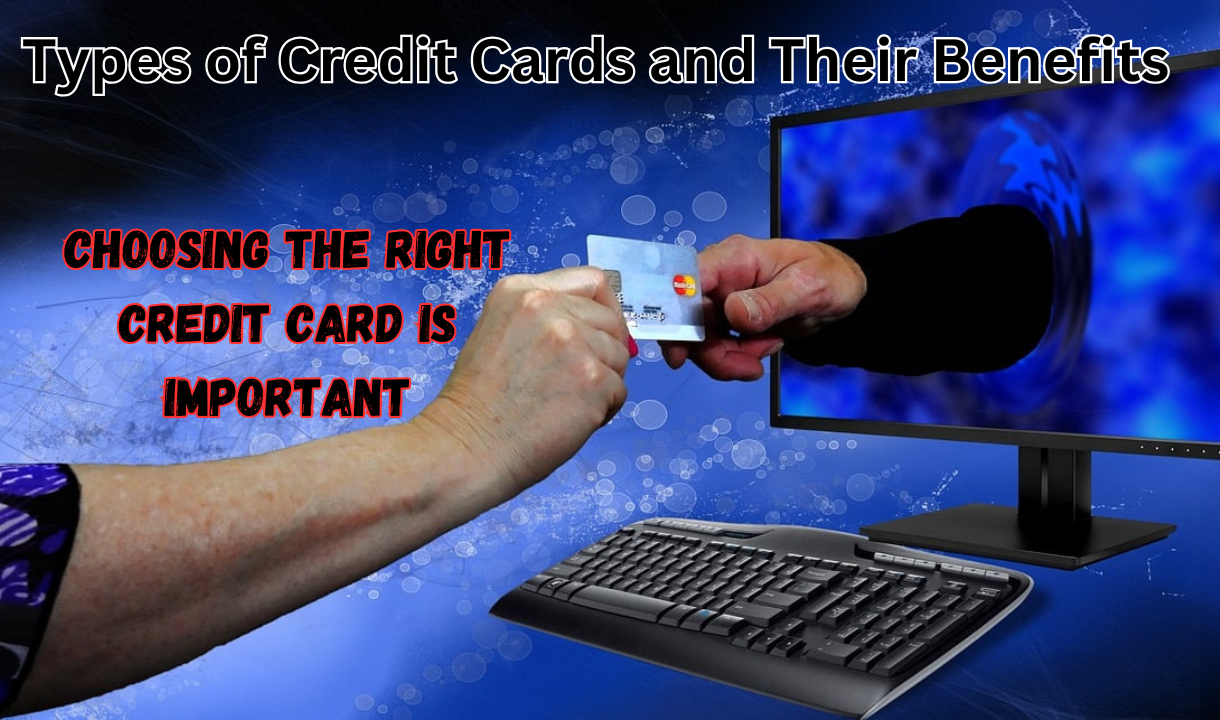Types of Credit Cards and Their Benefits Explained
Credit cards are one of the most powerful financial tools available today. They allow consumers to borrow money up to a certain limit, providing convenience and flexibility for purchasing goods and services. Moreover, many credit cards come with a host of benefits, including rewards, cashback, travel perks, and financial protections. With numerous types of credit cards available, it’s crucial to understand their distinct features and how they can help you achieve your financial goals. In this article, we will explore the different types of credit cards and their benefits in great detail to help you make an informed decision.
1. Standard Credit Cards: A Simple Solution for Everyday Purchases
Standard credit cards are the most basic type of credit card and are typically issued without any rewards programs or additional benefits. These cards allow users to make purchases and repay the balance over time, usually with an interest charge if the balance is not paid in full by the due date.
Key Features of Standard Credit Cards:
- Credit Limit: Standard credit cards come with a pre-set credit limit, typically based on your creditworthiness and income level.
- Annual Fees: Most standard credit cards have low to no annual fees, making them an affordable option for people looking to establish or rebuild their credit.
- Interest Rates: The interest rates on standard credit cards can be high, especially if you carry a balance month-to-month, but they typically offer lower rates than premium or rewards cards.
Benefits of Standard Credit Cards:
- Credit History Building: One of the most significant benefits of a standard credit card is the opportunity to build a positive credit history. Timely payments can increase your credit score, which can be helpful when applying for loans or other financial products.
- Affordability: Since these cards typically have low or no annual fees, they are more affordable for people who want to use a credit card without incurring high costs.
- Easy to Obtain: Standard credit cards are often easier to qualify for compared to other types of credit cards, especially for individuals with limited or no credit history.
2. Rewards Credit Cards: Maximize Benefits from Your Spending
Rewards credit cards are designed for individuals who want to earn rewards for their everyday spending. These cards offer various rewards, including points, miles, or cashback, which can be redeemed for merchandise, travel, gift cards, or statement credits.
Types of Rewards Credit Cards:
- Cashback Credit Cards: Offer cashback on every purchase, typically a percentage of the total spending.
- Points-based Credit Cards: Earn points for every dollar spent, which can be redeemed for a variety of rewards.
- Travel Rewards Credit Cards: Offer miles or points that can be redeemed for travel-related expenses, such as flights, hotels, and car rentals.
Benefits of Rewards Credit Cards:
- Earn While You Spend: Rewards credit cards allow you to earn points, miles, or cashback on every purchase, giving you a way to benefit from your regular spending.
- Variety of Redemption Options: Depending on the type of rewards card you have, you can redeem your earnings for travel, merchandise, or statement credits, providing a lot of flexibility.
- Sign-up Bonuses: Many rewards cards offer generous sign-up bonuses, such as a large number of points or cashback, once you spend a certain amount within the first few months of opening the account.
Example of Rewards Program (Cashback Credit Card):
| Category | Cashback Rate | Limit |
|---|---|---|
| Grocery Purchases | 3% | Up to $6,000 annually |
| Dining Expenses | 2% | Unlimited |
| Other Purchases | 1% | Unlimited |
3. Travel Credit Cards: Unlock Premium Travel Perks
Travel credit cards are designed to benefit individuals who frequently travel, whether for business or leisure. These cards offer a range of benefits that make traveling more affordable and enjoyable, such as earning miles for flights, hotel stays, and travel-related expenses.
Key Features of Travel Credit Cards:
- Frequent Flyer Miles: Travel cards often offer miles that can be redeemed for free or discounted flights on various airlines.
- Hotel Points: Some travel cards allow users to earn points for hotel stays, which can be redeemed at various hotel chains.
- Travel Insurance: Many travel credit cards include travel insurance that covers trip cancellations, lost baggage, or medical emergencies while traveling.
Benefits of Travel Credit Cards:
- Free Flights & Hotel Stays: By accumulating points or miles, cardholders can use them for free or discounted flights, hotel stays, or vacation packages.
- Exclusive Travel Benefits: Premium travel cards offer additional benefits, such as access to airport lounges, priority boarding, and travel concierge services, enhancing the overall travel experience.
- No Foreign Transaction Fees: Some travel credit cards waive foreign transaction fees, which can save you money when traveling internationally.
Example of Travel Card Benefits:
| Benefit | Description |
|---|---|
| Airline Miles | Earn miles for every dollar spent on flights. |
| Airport Lounge Access | Access to over 1,000 airport lounges globally. |
| Travel Insurance | Includes coverage for trip cancellations and medical emergencies. |
4. Cash Back Credit Cards: Simple Rewards with No Hassle
Cashback credit cards are a straightforward option for those who prefer direct rewards. With cashback cards, users earn a percentage of their spending back as cash. This cash can be used for anything, whether it’s paying off the credit card bill, depositing it into a bank account, or even using it for future purchases.
Key Features of Cash Back Credit Cards:
- Flat Rate or Tiered Rewards: Some cashback cards offer a flat percentage for all purchases, while others have tiered rates that provide higher cashback for certain categories (e.g., 5% on groceries, 1% on everything else).
- Automatic Redemption: Cashback is typically credited to the user’s statement or deposited into their account automatically.
Benefits of Cash Back Credit Cards:
- Simplicity: Cashback credit cards are easy to understand and use. The more you spend, the more cashback you earn.
- Flexible Rewards: The cashback can be used for any purpose, providing cardholders with the flexibility to choose how to use their rewards.
- No Redemption Limits: Unlike points-based cards, cashback rewards don’t expire, making them more user-friendly and practical for everyday use.
Example of Cashback Categories:
| Category | Cashback Rate | Reward Type |
|---|---|---|
| Groceries | 3% | Cashback |
| Gas | 2% | Cashback |
| Everything Else | 1% | Cashback |
5. Student Credit Cards: A Great Way to Build Credit Early
Student credit cards are designed specifically for college students who are just starting to build their credit history. These cards typically have lower credit limits and less stringent approval requirements.
Key Features of Student Credit Cards:
- Lower Credit Limits: The credit limit is usually lower than that of regular credit cards, which helps students manage their spending while building credit.
- Rewards and Perks: Some student cards offer rewards like cashback or points, as well as educational resources on credit management.
Benefits of Student Credit Cards:
- Credit Building: These cards help students establish a credit history, which can be crucial for future financial opportunities, such as renting an apartment or applying for loans.
- Financial Education: Student cards often come with resources to help young adults learn about managing credit, budgeting, and avoiding debt.
- Lower Interest Rates: Many student cards offer lower interest rates, which can be helpful if students occasionally carry a balance.
6. Business Credit Cards: Manage Business Expenses with Ease
Business credit cards are designed for small business owners, entrepreneurs, and corporate teams who need a way to manage business-related expenses. These cards typically offer higher credit limits and specialized features to cater to business needs.
Key Features of Business Credit Cards:
- Employee Cards: Business credit cards often allow business owners to issue additional cards to employees, making it easier to track and manage business expenses.
- Expense Tracking: Many business credit cards come with tools that help business owners categorize and track expenses, simplifying accounting and tax reporting.
Benefits of Business Credit Cards:
- Separation of Personal and Business Finances: Using a business credit card helps keep personal and business expenses separate, making financial management easier.
- Higher Credit Limits: Business credit cards typically offer higher credit limits, allowing business owners to make larger purchases without worrying about exceeding their limit.
- Tax Benefits: By tracking business expenses, business credit cards can simplify tax reporting and help maximize deductions.
7. Secured Credit Cards: Build or Rebuild Credit
Secured credit cards require a security deposit, which acts as collateral in case the cardholder is unable to make payments. These cards are typically used by individuals with no credit or poor credit to build or rebuild their credit score.
Key Features of Secured Credit Cards:
- Security Deposit: The deposit usually serves as the card’s credit limit, and the cardholder can request a higher limit by increasing the deposit.
- Credit Building: Payments made on a secured credit card are reported to the credit bureaus, helping users build or rebuild their credit scores.
Benefits of Secured Credit Cards:
- Credit Score Improvement: Secured cards help individuals with bad or no credit build a positive credit history by reporting payments to the credit bureaus.
- Low Risk for Lenders: Since the cardholder provides a deposit, there’s less risk to the lender, making it easier to obtain a card.
- Control Over Credit Limit: The credit limit is based on the amount of the security deposit, which gives the cardholder control over how much they can borrow.
8. Balance Transfer Credit Cards: Pay Off Debt More Effectively
Balance transfer credit cards allow you to transfer existing high-interest credit card debt to a new card with a lower interest rate, often with an introductory 0% APR for a set period.
Key Features of Balance Transfer Credit Cards:
- Introductory 0% APR: Many balance transfer cards offer 0% interest for an introductory period, which can help you pay down your debt faster without accruing interest.
- Transfer Fees: Some balance transfer cards charge a fee for transferring a balance, usually a percentage of the amount transferred.
Benefits of Balance Transfer Credit Cards:
- Lower Interest Rates: Transferring high-interest debt to a card with 0% APR can save you money on interest and help you pay off debt more quickly.
- Debt Consolidation: These cards offer an opportunity to consolidate multiple debts onto one card, simplifying your payments and reducing the risk of missing due dates.
9. Premium Credit Cards: Luxury Perks for the Elite Consumer
Premium credit cards are designed for individuals with excellent credit and high spending power. They offer luxurious benefits, including concierge services, exclusive travel perks, and access to VIP events.
Key Features of Premium Credit Cards:
- High Annual Fees: Premium cards often come with hefty annual fees, but the benefits they offer can outweigh the costs for frequent travelers or luxury spenders.
- Exclusive Access: Premium cards provide access to exclusive events, lounges, and experiences not available to the general public.
Benefits of Premium Credit Cards:
- Concierge Services: Premium cards often offer 24/7 concierge services, which can assist with booking travel, making reservations, and even acquiring tickets to exclusive events.
- Luxury Travel Perks: Premium cards often include access to airport lounges, free hotel upgrades, and other travel perks that make luxury travel more enjoyable.
Conclusion: Selecting the Best Credit Card for Your Needs
When choosing a credit card, it’s important to consider your financial goals and spending habits. Whether you’re building your credit, earning rewards, traveling more, or managing debt, there’s a card tailored to your needs. By understanding the different types of credit cards available and their unique benefits, you can make an informed decision and find the card that offers the most value for your lifestyle.
FAQ: Common Questions About Credit Cards
1. What is a credit card?
A credit card is a financial tool that allows you to borrow money from a bank or lender to make purchases or pay for services. You are required to repay the borrowed amount, either in full or through monthly installments. Interest is charged on any balance carried beyond the due date.
2. What are the different types of credit cards?
There are several types of credit cards, each designed for different financial needs:
- Standard Credit Cards – Basic cards with no rewards, mainly used for purchases and credit building.
- Rewards Credit Cards – Offer cashback, points, or miles as a reward for spending.
- Travel Credit Cards – Specifically designed for frequent travelers, offering travel-related benefits like points for flights and hotel stays.
- Cashback Credit Cards – Provide cashback on purchases, usually a percentage of what you spend.
- Student Credit Cards – Tailored for students to help build credit history with lower credit limits and easier qualifications.
- Business Credit Cards – Created for small business owners to track and manage business expenses.
- Secured Credit Cards – Require a deposit and help people with poor or no credit to build or rebuild their credit scores.
- Balance Transfer Credit Cards – Allow transferring high-interest debt to a new card with a lower or 0% introductory APR.
- Premium Credit Cards – Offer luxury perks and benefits, often requiring a high income or excellent credit score.
3. How do credit cards work?
Credit cards allow you to borrow money from the card issuer up to a predetermined credit limit. When you make purchases, you borrow money that you are required to repay by the due date. If you don’t pay the full balance, you are charged interest on the remaining amount. Many credit cards also offer rewards or cashback based on how much you spend.
4. How can I build my credit with a credit card?
Using a credit card responsibly is one of the easiest ways to build or improve your credit score. Here’s how:
- Make Payments on Time: Always pay at least the minimum payment by the due date.
- Keep Your Balance Low: Try not to carry a balance close to your credit limit. Ideally, keep your utilization rate below 30%.
- Monitor Your Credit Reports: Regularly check your credit reports to ensure accuracy and spot any potential errors or fraudulent activity.
5. What is the difference between a credit card and a debit card?
A credit card allows you to borrow money from the bank or credit issuer, whereas a debit card directly withdraws money from your checking or savings account. Credit cards can build your credit score, offer rewards, and allow you to carry a balance (with interest), whereas debit cards cannot do any of these.
6. How do rewards work on credit cards?
Rewards on credit cards are typically earned by spending money on the card. You can earn rewards in the form of points, miles, or cashback. Depending on the card type, you may earn higher rewards in specific categories like travel, dining, or groceries. These rewards can then be redeemed for various items, statement credits, or travel perks.
7. What are the benefits of a travel credit card?
Travel credit cards offer several benefits, such as:
- Airline Miles: Earn miles for flights that can be redeemed for free or discounted tickets.
- Hotel Stays: Earn points for stays at hotels and resorts, which can be redeemed for free nights or upgrades.
- Travel Insurance: Travel cards often come with travel insurance coverage, including trip cancellations, lost baggage, and medical emergencies.
- No Foreign Transaction Fees: Some travel cards waive foreign transaction fees, saving money when traveling abroad.
8. What is the annual fee on credit cards?
An annual fee is a yearly charge that some credit cards impose. It typically ranges from $25 to $550, depending on the type of card. Cards with more benefits, such as premium travel perks or cashback rewards, often have higher annual fees. However, some cards do not charge an annual fee, making them more affordable for those who don’t need additional perks.
9. What happens if I miss a payment?
Missing a credit card payment can lead to late fees, higher interest rates, and a negative impact on your credit score. To avoid this, make at least the minimum payment on time, and consider setting up reminders or automatic payments to ensure timely payments.
10. What is a credit limit?
A credit limit is the maximum amount of money you can borrow on a particular credit card. This limit is determined by the card issuer based on factors such as your income, credit score, and payment history. Exceeding the credit limit may result in over-limit fees, higher interest rates, or a decline in new charges.
11. Can I use a credit card for cash withdrawals?
Yes, you can use your credit card for cash withdrawals, also known as a cash advance. However, this option typically comes with high fees and higher interest rates, which begin accruing immediately. It’s generally better to avoid using a credit card for cash advances unless absolutely necessary.
12. How do balance transfer credit cards work?
Balance transfer credit cards allow you to transfer existing credit card debt to a new card, usually with a lower or 0% introductory APR for a set period (e.g., 12 to 18 months). This can help you pay off your debt faster and save money on interest. Be aware that there is often a balance transfer fee (typically 3% to 5% of the amount transferred), and the introductory rate may increase after the promotional period ends.
13. What should I consider when choosing a credit card?
When choosing a credit card, consider the following:
- Rewards and Benefits: Do you prefer cashback, points, or travel rewards?
- Interest Rates: Look for cards with low interest rates if you plan to carry a balance.
- Annual Fees: Consider whether the card’s benefits justify the annual fee.
- Credit Requirements: Some cards require excellent credit, while others are easier to qualify for.
- Other Perks: Does the card offer additional benefits, like travel insurance or purchase protection?
14. Can I get a credit card with bad credit?
Yes, there are credit cards specifically designed for individuals with bad or limited credit. These cards, such as secured credit cards, require a deposit to act as collateral. If you make timely payments, you can gradually improve your credit score and eventually qualify for an unsecured card.
15. How can I avoid credit card debt?
To avoid credit card debt, follow these tips:
- Pay off your balance in full each month to avoid paying interest.
- Keep track of your spending to ensure you don’t exceed your budget.
- Set up automatic payments or reminders to ensure you make payments on time.
- Use credit responsibly by not borrowing more than you can afford to repay.







I really like reading through a post that can make men and women think. Also, thank you for allowing me to comment!
Good post! We will be linking to this particularly great post on our site. Keep up the great writing
Hi there to all, for the reason that I am genuinely keen of reading this website’s post to be updated on a regular basis. It carries pleasant stuff.
For the reason that the admin of this site is working, no uncertainty very quickly it will be renowned, due to its quality contents.
Awesome! Its genuinely remarkable post, I have got much clear idea regarding from this post